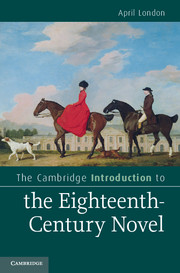Book contents
Chapter 6 - The sociability of books
Published online by Cambridge University Press: 05 June 2012
Summary
If we broaden the notion of family investigated in Chapters 4 and 5 to describe relations between books as well as individual characters, eighteenth-century fiction offers much to consider. Our tendency to regard the writing and reading of novels as essentially private and singular activities is in fact anomalous within eighteenth-century experience. On the one hand, the reading aloud of novels was a customary practice, especially welcome in domestic circles. More abstractly, significant changes in literary production and consumption over the period – the decreasing importance of patronage, the professionalization of authorship, the expansion of reading audiences (along with anxieties about their diversity and the interpretative freedoms they might assume), the problems with copyright infringement and piracy that increased as the book trade grew – encouraged kinds of formal experimentation that build on the premise of the novel’s intrinsic sociability. The chapter that follows explores three particular contexts in which bookish versions of sociability overlap: sequels, intertextuality, and parody. I focus initially on two sequels: Jane Barker’s Galesia Trilogy (1713–26) and Sarah Fielding’s David Simple (1744) and Volume the Last (1753); then turn to a trio of works whose intertextual references put in play a less tangible, but still compelling, notion of family resemblance: Frances Burney’s Evelina (1778), Elizabeth Inchbald’s A Simple Story (1791), and Amelia Opie’s Adeline Mowbray (1805); and conclude with a brief look at parodies that demonstrate the novel’s commitment to maintaining cultural currency through ongoing assessment of established conventions: William Beckford’s Modern Novel Writing (1796), Eaton Stannard Barrett’s The Heroine Or Adventures of a Fair Romance Reader (1814), and Jane Austen’s Northanger Abbey (1817).
- Type
- Chapter
- Information
- The Cambridge Introduction to the Eighteenth-Century Novel , pp. 139 - 160Publisher: Cambridge University PressPrint publication year: 2012



